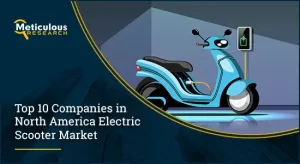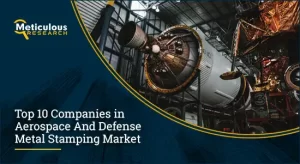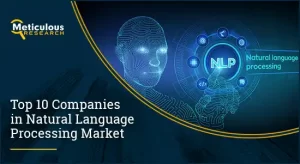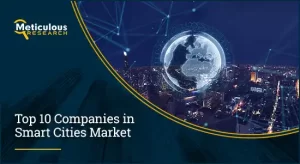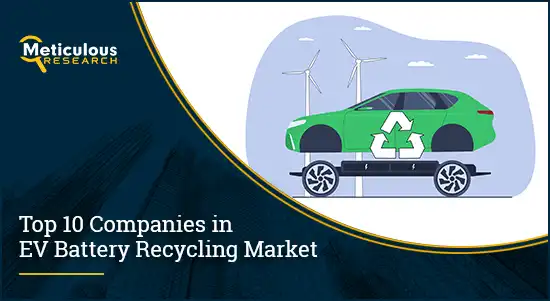
The EV Battery Recycling Market is projected to reach $6.5 billion by 2030, at a CAGR of 37.1% from 2023 to 2030. The growth of this market is driven by the increasing demand for electric vehicles, stringent regulatory frameworks for battery recycling, and increasing concerns over the depletion of raw material resources. However, safety issues related to the storage and transportation of used batteries restrain the growth of this market.
Increasing government incentives for battery recycling and innovations in battery recycling technologies are expected to generate market growth opportunities. However, the high costs of recycling EV batteries are a major challenge for the players operating in this market. Furthermore, increasing investments in battery recycling infrastructure in emerging economies is a key trend in the EV battery recycling market.
Here are the top 10 companies operating in the EV Battery Recycling Market
![]() Founded in 1974 and headquartered in Baar, Switzerland, Glencore plc is engaged in the recycling of end-of-life electronics, lithium-ion batteries, and other critical metal-containing products such as copper, nickel, cobalt, zinc, and precious metals. The company processes complex input materials such as lithium-ion batteries to support the battery supply chain. The company operates through two business segments, namely, Marketing activities and Industrial activities.
Founded in 1974 and headquartered in Baar, Switzerland, Glencore plc is engaged in the recycling of end-of-life electronics, lithium-ion batteries, and other critical metal-containing products such as copper, nickel, cobalt, zinc, and precious metals. The company processes complex input materials such as lithium-ion batteries to support the battery supply chain. The company operates through two business segments, namely, Marketing activities and Industrial activities.
Glencore also recycles a wide range of metal-containing scrap materials, including brass, turnings, and residues such as trash, sludge, hydroxide, dust, incinerator slag, and various copper-bearing materials from end-of-life processing of automobiles. The company produces and markets a wide range of metals and minerals, such as copper, cobalt, zinc, nickel, and ferroalloys. Furthermore, the company also markets aluminum /alumina and iron ore from third parties.
Fortum Corporation (Finland)
![]() Founded in 1998 and headquartered in Espoo, Finland, Fortum Corporation is engaged in CO2-free power generation, electricity sales, district heating, and recycling and waste solutions. The company offers various waste recycling services such as battery recycling, which includes end-of-life services and recycling solutions for lithium-ion batteries and recovery the valuable battery materials for reuse; plastic recycling of post-consumer plastic waste; ash recycling solutions for waste-to-energy and other industrial residues and recovery of valuable materials for reuse; metal recycling for collecting and sorting different kinds of metal waste and recycled metal granulates for industrial needs; and waste management.
Founded in 1998 and headquartered in Espoo, Finland, Fortum Corporation is engaged in CO2-free power generation, electricity sales, district heating, and recycling and waste solutions. The company offers various waste recycling services such as battery recycling, which includes end-of-life services and recycling solutions for lithium-ion batteries and recovery the valuable battery materials for reuse; plastic recycling of post-consumer plastic waste; ash recycling solutions for waste-to-energy and other industrial residues and recovery of valuable materials for reuse; metal recycling for collecting and sorting different kinds of metal waste and recycled metal granulates for industrial needs; and waste management.
Fortum offers EV battery recycling services through processes such as the mechanical process and the hydrometallurgical recycling process. The company operates through five business segments, namely, Consumer Solutions, Generation, City Solutions, Russia, and Other Operations. The City Solutions segment comprises heating, cooling, waste-to-energy, and circular economy solutions, as well as solar power generation, services, and the development of new biomass-based businesses.
![]() Founded in 1989 and headquartered in Brussels, Belgium, Umicore NV is a provider of recycling services for lithium-ion, lithium polymer, and nickel metal hydride batteries from all possible applications across the globe. The company’s recycling facilities and plants recover various precious and non-ferrous metals from various sources, including industrial residues, electronic scrap, batteries, automotive and industrial catalysts, and fuel cells. Umicore provides EV battery recycling services and solutions. Additionally, the company develops customized materials with processes that accommodate health and safety, recyclability, cost efficiency, waste reduction, and energy efficiency throughout the value chain.
Founded in 1989 and headquartered in Brussels, Belgium, Umicore NV is a provider of recycling services for lithium-ion, lithium polymer, and nickel metal hydride batteries from all possible applications across the globe. The company’s recycling facilities and plants recover various precious and non-ferrous metals from various sources, including industrial residues, electronic scrap, batteries, automotive and industrial catalysts, and fuel cells. Umicore provides EV battery recycling services and solutions. Additionally, the company develops customized materials with processes that accommodate health and safety, recyclability, cost efficiency, waste reduction, and energy efficiency throughout the value chain.
The company operates through three business segments, namely, Catalysis, Energy & Surface Technologies, and Recycling. The Recycling segment offers battery recycling solutions and recovery of jewelry and industrial metals.
Li-Cycle Holdings Corp. (Canada)
![]() Founded in 2016 and headquartered in Toronto, Canada, Li-Cycle Holdings is a leader in lithium-ion battery resource recovery and lithium battery recycling. The company processes battery manufacturing scrap and end-of-life batteries to produce black mass, a type of e-waste comprising crushed and shredded battery cells and other intermediate products. Li-Cycle sources material for recycling from three key sources: battery manufacturing scrap; damaged, defective, or recalled lithium-ion batteries; and end-of-life lithium-ion batteries.
Founded in 2016 and headquartered in Toronto, Canada, Li-Cycle Holdings is a leader in lithium-ion battery resource recovery and lithium battery recycling. The company processes battery manufacturing scrap and end-of-life batteries to produce black mass, a type of e-waste comprising crushed and shredded battery cells and other intermediate products. Li-Cycle sources material for recycling from three key sources: battery manufacturing scrap; damaged, defective, or recalled lithium-ion batteries; and end-of-life lithium-ion batteries.
Li-Cycle Holdings has a strong geographic presence across the United States and Canada through its subsidiaries and strong distribution network.
Lithion Recycling Inc. (Canada)
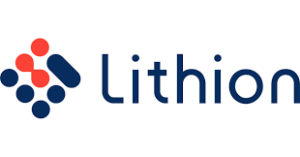 Founded in 2018 and headquartered in Quebec, Canada, Lithion Recycling is a privately held company that engages in recycling lithium-ion batteries from electric vehicles and portable electronics to recover valuable materials and end-of-life and production waste of lithium-ion batteries. The company provides various battery recycling solutions, including EV battery recycling.
Founded in 2018 and headquartered in Quebec, Canada, Lithion Recycling is a privately held company that engages in recycling lithium-ion batteries from electric vehicles and portable electronics to recover valuable materials and end-of-life and production waste of lithium-ion batteries. The company provides various battery recycling solutions, including EV battery recycling.
Lithion Recycling uses a combination of hydrometallurgy-based extraction processes to recycle lithium-ion batteries. Through its strong distribution network, the company has a strong geographic presence across North America and Europe.
Meticulous Research in its latest publication on EV Battery Recycling Market has predicted the growth of 37.1% during the forecast year 2023-2030.
Tata Chemicals Limited (India)
 Founded in 1939 and headquartered in Mumbai, India, Tata Chemicals Limited is one of the leading players engaged in manufacturing chemical products and offering basic and industrial chemicals, fertilizers, and other consumer products. The company’s lithium-ion battery business supports a circular economy. Tata Chemicals operates through two business segments, namely, Basic Chemistry Products and Specialty Products. The Specialty Products segment offers agro sciences solutions, nutritional sciences solutions, and material sciences solutions, including nano zinc oxide, specialty silica, energy storage solutions, and recycling of lithium-ion batteries.
Founded in 1939 and headquartered in Mumbai, India, Tata Chemicals Limited is one of the leading players engaged in manufacturing chemical products and offering basic and industrial chemicals, fertilizers, and other consumer products. The company’s lithium-ion battery business supports a circular economy. Tata Chemicals operates through two business segments, namely, Basic Chemistry Products and Specialty Products. The Specialty Products segment offers agro sciences solutions, nutritional sciences solutions, and material sciences solutions, including nano zinc oxide, specialty silica, energy storage solutions, and recycling of lithium-ion batteries.
Attero Recycling Pvt. Ltd. (India)
![]() Founded in 2008 and headquartered in Uttar Pradesh, India, Attero Recycling Pvt. Ltd. is a privately held company that provides recycling and waste management services. The company recycles various products to extract reusable materials such as mobile phones; display units such as cathode ray tubes (CRT) and TFT and flat panel displays; IT goods such as electronics ranging from desktops, laptops, and servers to printers, scanners, and copiers; electronic printed circuit boards such as significant quantities of metals such as lead, copper, and nickel; and Li-ion battery. Through its strong distribution network, the company has a strong geographic presence across India, South Korea, Australia, and Hungary.
Founded in 2008 and headquartered in Uttar Pradesh, India, Attero Recycling Pvt. Ltd. is a privately held company that provides recycling and waste management services. The company recycles various products to extract reusable materials such as mobile phones; display units such as cathode ray tubes (CRT) and TFT and flat panel displays; IT goods such as electronics ranging from desktops, laptops, and servers to printers, scanners, and copiers; electronic printed circuit boards such as significant quantities of metals such as lead, copper, and nickel; and Li-ion battery. Through its strong distribution network, the company has a strong geographic presence across India, South Korea, Australia, and Hungary.
SNAM S.A.S. (France)
Founded in 1981 and headquartered in Viviez, France, SNAM provides rechargeable battery recycling solutions. SNAM is a subsidiary company of Floridienne S.A. (Europe). The company recovers batteries from rechargeable battery manufacturers, national collection associations, and independent collectors in Europe, the USA, and Asia-Pacific for recycling used batteries. The company recycles two types of batteries: portable batteries, which encompass batteries from mobile phones, portable computers, and cordless tools and industrial batteries, comprising batteries from aviation, railways, military, and electric vehicles.
Floridienne S.A. operates through three business segments, namely, Life Sciences, Gourmet Food, and Chemicals. SNAM operates in the Li-ion battery recycling market through the Chemicals segment of its parent company, Floridienne.
Redwood Materials, Inc. (U.S.)
![]() Founded in 2017 and headquartered in Nevada, U.S., Redwood Materials, Inc. offers a closed-loop solution and domestic supply chain for lithium-ion batteries in the collection, refurbishment, recycling, refining, and remanufacturing of sustainable battery materials.
Founded in 2017 and headquartered in Nevada, U.S., Redwood Materials, Inc. offers a closed-loop solution and domestic supply chain for lithium-ion batteries in the collection, refurbishment, recycling, refining, and remanufacturing of sustainable battery materials.
The company offers recycling, refining, and remanufacturing services for Li-ion batteries. Furthermore, it recycles scrap from battery cell production and consumer electronics through a combination of pyrometallurgy and hydrometallurgy to remove organic materials and plastics and dissolve metals into a solution.
Redwood Materials transforms the battery supply chain by offering large-scale sources of domestic anode and cathode materials produced from recycled batteries.
Primobius GmbH (Germany)
![]() Founded in 2020 and headquartered in Hilchenbach, Germany, Primobius GmbH is a privately held company and a joint venture between Australian Securities Exchange listed company Neometals Ltd (Australia) and private German global plant manufacturer, SMS group GmbH (Germany) to commercialize an efficient, environmentally friendly recycling solution for end-of-life and scrap lithium-ion battery (LIB) cells. The Primobius recycling process offers a scaleable, efficient, sustainable recycling solution that generates high purity, low carbon footprint battery materials for reuse in the battery supply chain. The company provides a two-stage process for Li-ion battery recycling. In the first stage, shredding and beneficiation are employed to physically separate components and eliminate metal casings, electrode foils, and plastics from the primary battery materials. The second stage involves leaching, purification, and precipitation, generating refined chemical products through the hydrometallurgical processing facility. Primobius GmbH provides Li-ion battery recycling technology to recover cobalt, nickel, lithium, copper, iron, aluminum, carbon, plastics, and manganese into saleable products for reuse in the battery sup
Founded in 2020 and headquartered in Hilchenbach, Germany, Primobius GmbH is a privately held company and a joint venture between Australian Securities Exchange listed company Neometals Ltd (Australia) and private German global plant manufacturer, SMS group GmbH (Germany) to commercialize an efficient, environmentally friendly recycling solution for end-of-life and scrap lithium-ion battery (LIB) cells. The Primobius recycling process offers a scaleable, efficient, sustainable recycling solution that generates high purity, low carbon footprint battery materials for reuse in the battery supply chain. The company provides a two-stage process for Li-ion battery recycling. In the first stage, shredding and beneficiation are employed to physically separate components and eliminate metal casings, electrode foils, and plastics from the primary battery materials. The second stage involves leaching, purification, and precipitation, generating refined chemical products through the hydrometallurgical processing facility. Primobius GmbH provides Li-ion battery recycling technology to recover cobalt, nickel, lithium, copper, iron, aluminum, carbon, plastics, and manganese into saleable products for reuse in the battery sup
Authoritative Research on the EV Battery Recycling Market - Global Opportunity Analysis and Industry Forecast (2023-2030)
Need more information? Meticulous Research®’s new report covers each of these companies in much more detail, providing analysis on the following:
- Recent financial performance
- Key products
- Significant company strategies
- Partnerships and acquisitions
The Comprehensive report provides global market size estimates, market share analysis, revenue numbers, and coverage of key issues and trends.
About Post Author
Meticulous Research
Additional resources
- Jeux Casino En Ligne
- Meilleur Casino En Ligne
- Meilleur Casino En Ligne
- Meilleur Casino En Ligne
- Sites De Paris Sportifs En Belgique
- Site Paris Sportif Belgique
- Paris Sportifs Belgique
- Meilleur Casino En Ligne Belgique
- Meilleur Site Casino En Ligne Belgique
- Migliori Casino Online
- Casino Online App
- Siti Scommesse Bitcoin
- Site De Paris Sportif Bonus
- Sweet Bonanza Avis
- Ufc Paris Sportif
- オンカジ 出金 早い
- 本人確認不要 カジノ
- онлайн казино зарубежные
- Nhà Cái đến Từ Châu âu
- Site Paris Sportif Retrait Instantané
- Site De Paris Sportifs
- Nouveau Casino En Ligne Francais
- Casino En Ligne
- Nouveau Casino En Ligne Fiable
- Casino En Ligne 2026
- Casino Senza Richiesta Documenti
- Casino En Ligne Qui Paye Vraiment
- Casino En Ligne Fiable
- Casino Bitcoin
- Casino Italiani Non Aams
- Migliori Casino Online Italia
- Siti Non Aams Sicuri
- Casino Non Aams
- Meilleur Site De Casino En Ligne Belgique
- オンラインカジノ
- Meilleur Casino En Ligne France
- Casino En Ligne France
- Casino En Ligne Qui Paye Rapidement
- Casino En Ligne 2026
- Casino En Ligne


